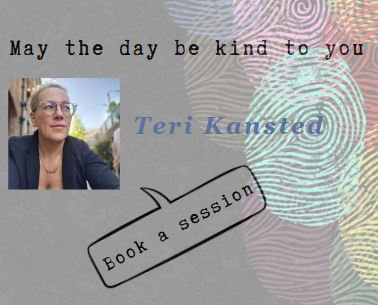What Happens If I Have a Session Booked and I'm Having a Bad Day?
Below link is a recording of this blog
Usually with pretty much all professionals be that a physiotherapist, dentist, psychologist, accountant, hairdresser, doctor or lawyer you'll need to book an appointment in advance. Which is tricky when you don't know how you're going to feel on that future day - does it end up being on a day where you have no energy left? Perhaps you're feeling unable to communicate verbally or via the chat function? Maybe you just want to cry the whole hour but that feels a waste of time and, more importantly perhaps, waste of money. Then what? Because most professionals also have a cancellation policy, so does that mean you have to pay even though you might need to cancel because your mental health isn't up for the session? Pay a mental health professional because you have poor mental health??
Unfortunately, yes, even if it seems really unfair.
I can't talk on behalf of all professions but late cancellations means a hole in the diary that could have gone to someone else if enough cancellation time was offered, meaning that others could have benefitted from the availability (this is, perhaps, more obvious when we're talking about a GP and the enormous pressure doctor surgeries are under) and it might also mean an impact on income, which is especially relevant for small business owners and self-employed people like myself.
I only have mental space for 12 clients in a week even though I work full-time the rest of my hours are unpaid, like all the admin I have to do to run a business, or when writing blog posts, or answering emails. I'm also not paid for my days off/holidays or when I'm off sick. There's no pension included in my job and all expenses has to come out of my own account like business insurance, this website domain and so on.
I have to protect my own finances so that my mental health doesn't suffer as 12 hours of income a week isn't much (which is also why seeing someone in private practice isn't cheap... though often cheaper or the same as going to a fancy hairdresser or getting a massage despite the qualifications and demands for these different professions varying significantly).
I'd love to tell the people I work with that if they're having an off day they can just cancel, free of charge. I'm not interested in making you show up to something you don't want to attend or make you feel worse because you feel you have to show up to not lose out on your financial investment and then we have a rubbish session together. And I'd prefer the people I work with would give themselves the grace of cancelling the session even if they still have to pay to not add any unnecessary stress to their system. But I understand how much it'll rub us the wrong way to pay for something we feel we didn't get. And this in itself could also add stress to our system.
I've had plenty of people come on a bad day and as I said, it's not ideal for either one of us. The person I'm working with might feel forced to be there, a bit annoyed or disempowered and I might be feeling guilty with a desire to offer a reschedule while worrying about both mine and their finances. However, I've also had pretty much the same amount of people tell me at the end that they're glad they showed up after all and that it wasn't a waste. We always find something to explore or they relish in a space where there are no demands of productivity and where they can just cry or knit or talk rubbish with a person who isn't judging them or forcing them to do something they don't want to and that's therapeutic as well.

There's also an element of feeling like we're throwing money out if we cancel a session we still have to pay for or if we show up for a session we don't want to have, but I also think there's an important discussion here around some sort of productivity-guilt. That we think we have to achieve something for it to be worthwhile and that worthwhile-ness is based on productivity. If you've paid for a session that you're not attending but instead take a nap and look after yourself, that was a worthwhile decision, in my opinion. And if you show up to a session simply to hang out with someone who accepts you as you are on that day, I also think that's a worthwhile investment.
But I do, of course, understand that money is tight for most people - especially for those needing therapy and even more so among discriminated groups, like neurodivergents.
My compromise is this: You don't have to commit to sessions on any given day or frequency. Because sometimes when we commit to weekly or fortnightly sessions we realise we have nothing to bring that day and again it can feel like a wasted investment.
Instead, with me, you can book as late as two days before a session (if using my booking link and you're always welcome to email to ask if I have any availability sooner) and therefore only book when you feel you have something to bring to the session and do an audit of your week to try and ensure you're booking a session on a day where there's a good chance you'll have energy and be able to get something out of the session.
There's also a responsibility on people in therapy to manage their energy around upcoming sessions and not cramp it in because there's an hour free in the diary. That's to some extent a privileged thing to say but therapy is supposed to be about you taking care of your mental health so if the set-up around how you access a therapy session isn't benefitting your mental health then that's something to be aware of but also something only you can address and make changes around. Much like it's a great idea to make sure you have space after a session to check-in with yourself to see how you're doing and if there's something you need (a nap, a hug, a walk in nature, water, journalling, gaming, etc) and not rush straight back into work or making dinner for the whole family.
I hope this makes sense, though it's yet another way that our mental health is part of the capitalist system and our neurotype and sometimes disabling environment can impact us financially which is unjust. I wish psychotherapy was funded by the Government and was accessible to all without negative consequences (like being financially punished for having a bad day). This is the utopia I dream of... Or, better yet, a world where psychotherapists are no longer needed <3
Thank you for reading and thank you for being a generous reader. I'm dyslexic and even with all the spell-check and grammar help I get from various software, mistakes will still crop up. Allowing my mistakes to exist without shame and, hopefully, without receiving corrections, allows me the space and freedom to unmask in my writing.
